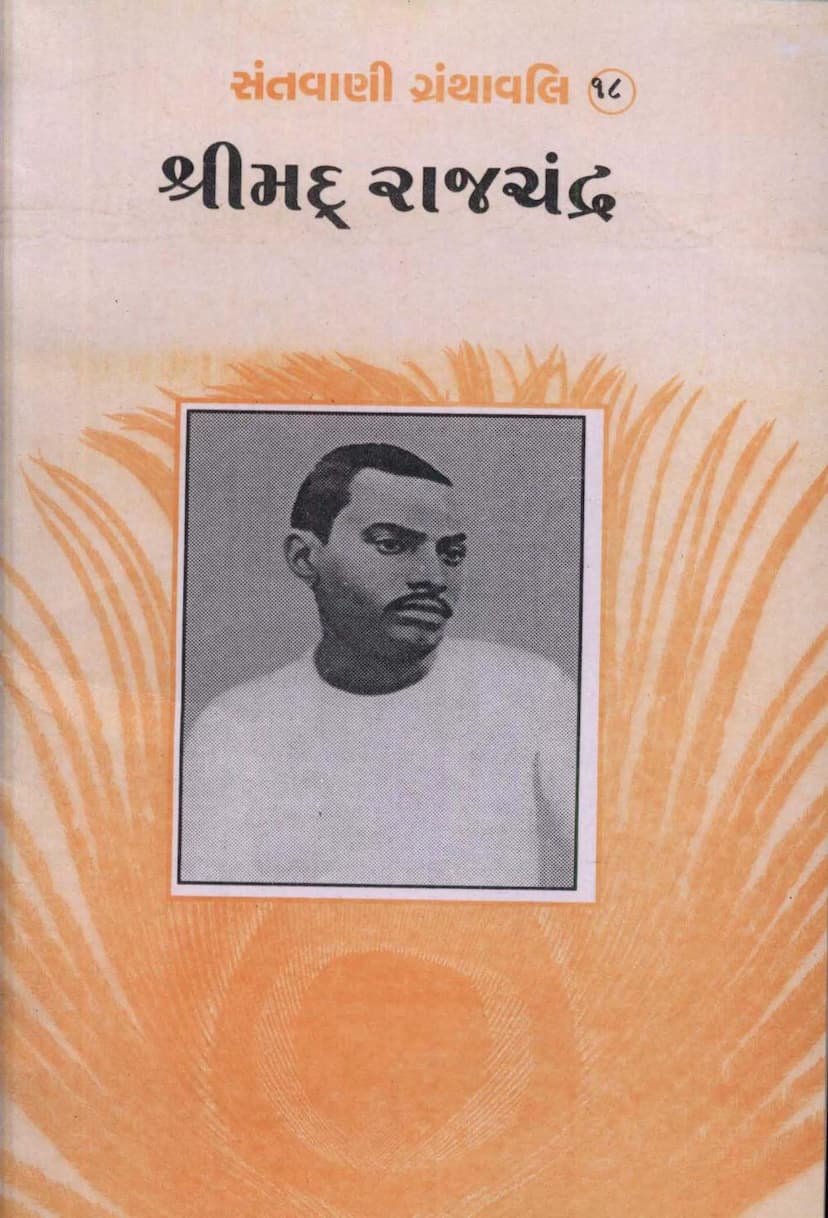Rajchandra Santvani 18
Added to library: September 2, 2025

Summary
This document is an excerpt from "Rajchandra Santvani 18," compiled by Tarbahen Acharya and published by Navjivan Prakashan Mandir. It is part of a larger series called "Santvani Granthavali," which aims to spread the message of interfaith harmony, inspired by Mahatma Gandhi.
The book focuses on the life and teachings of Shrimad Rajchandra, a prominent Jain spiritual leader and a contemporary of Mahatma Gandhi, who had a profound influence on Gandhi's spiritual and philosophical development.
Key aspects covered in the text:
- Introduction to Shrimad Rajchandra: The text begins with a salutation to Shrimad Rajchandra, acknowledging his role in presenting the path of Vitaraga (non-attached beings) and expressing profound gratitude for this gift.
- Biographical Sketch ("Jivan Zarmar"):
- Birth and Early Life: Shrimad Rajchandra was born on November 12, 1867, in Vavanaiya, Gujarat, into a merchant family. His birth coincided with the birth anniversary of Acharya Hemchandracharya.
- Prodigious Intellect: From a young age, he displayed exceptional intelligence, a sharp memory, and a talent for poetry. He completed his schooling in just two years and began writing poetry at the age of eight.
- Spiritual Inclinations and Early Influences: Influenced by his father's devotion to Krishna and his mother's Jain upbringing, he showed a mixed interest in various religious traditions. He initially wore a Vaishnavite thread and was drawn to the stories of divine incarnations.
- Early Encounters with Jainism: He later studied Jain scriptures, which instilled in him a sense of universal friendship. He appreciated the clean practices and principles of the Vaishnav tradition as well as the Jain dharma.
- Childhood Experiences and Awakening: A significant event was witnessing a cremation at the age of seven, which sparked a profound questioning about death and the nature of existence. This event is linked to his realization of past life memories and a growing sense of detachment.
- Education and Intellectual Development: He pursued English education in Rajkot and continued his studies privately, demonstrating a keen interest in various subjects.
- Demonstration of Extraordinary Powers: The text recounts instances where Shrimad Rajchandra displayed extraordinary abilities, such as knowing the arrival of visitors by name even before meeting them, attributed to his inner spiritual strength.
- Influence on Mahatma Gandhi: The text highlights Gandhi's deep respect for Shrimad Rajchandra, quoting him as saying that Rajchandra was one of the three people who had a profound impact on his life. Gandhi learned about compassion and simple living from him.
- Literary Works: The book mentions several of his significant works, including "Mokshmala" (composed at 16), "Pushpamala," "Stree Niti Bodh," and "Shri Atma Siddhi Shastra" (written in just 1.5 hours at 28), all of which are noted for their profound spiritual and ethical content.
- Marriage and Household Life: He married Zabakbai at the age of 19. Despite embracing married life, he continued to experience intense spiritual introspection and a growing sense of renunciation.
- Business Acumen and Principles: He engaged in business with his partners, demonstrating remarkable business skill and integrity. He operated with principles of non-judgment, self-reflection, and treating others with kindness.
- Spiritual Realization: At the age of 28, he achieved self-realization.
- Later Life and Renunciation: In 1900, at the age of 33, he renounced worldly life and entered Vanaprastha (hermitage) and later Sannyasa (renunciation), despite having a large family. His health deteriorated significantly due to his intense spiritual practices and hard work.
- Demise: Shrimad Rajchandra passed away on April 9, 1901, at the age of 34, attaining Moksha.
- Inspiring Incidents ("Shrimadna Prerak Prasango"): This section provides several anecdotes that illustrate Shrimad Rajchandra's wisdom, compassion, and spiritual insights. These include:
- A discussion on pride versus humility in spiritual practice.
- Advice on transcending worldly desires and focusing on the soul.
- The importance of the soul over the body, using the analogy of ghee and buttermilk.
- The significance of righteous conduct and the need to cultivate good thoughts.
- A discourse on love and service, questioning the societal emphasis on marital love over other forms of devotion.
- Discussions on the nature of attachment, the path to spiritual realization, and the practice of devotion.
- His Amrit Prasadi (Nectar-like Writings): This section details his various literary contributions, categorized by type, including letters, poems, independent treatises, and translations. It highlights the essence and purpose of some of his key works like "Pushpamala," "Stree Niti Bodh," and "Mokshmala," emphasizing their ethical and spiritual guidance.
- Detailed Analysis of Key Works: The text provides excerpts and explanations of "Mokshmala," "Atma Siddhi Shastra," and other writings, explaining their philosophical underpinnings and practical guidance for spiritual seekers.
- Discussions on Philosophical Questions: The text includes a question-and-answer session where Shrimad Rajchandra addresses profound philosophical questions related to the nature of the soul, God, karma, salvation, and the validity of various religious traditions (Hinduism, Buddhism, Christianity), offering his unique insights. He particularly emphasizes the Jain perspective on these matters, clarifying concepts like "Isvar" and the origin of the universe, and refuting the idea of a creator God in the conventional sense. He also clarifies the concept of reincarnation and the progression of the soul.
- The Importance of His Teachings: The text concludes by emphasizing the value of Shrimad Rajchandra's writings for anyone seeking spiritual liberation and righteousness, highlighting their immense contribution to Jain philosophy and Gujarati literature.
In essence, "Rajchandra Santvani 18" is a tribute to Shrimad Rajchandra's remarkable life, his profound spiritual insights, his influential writings, and his role in shaping the spiritual and ethical landscape of India, particularly through his impact on Mahatma Gandhi. The book serves as a guide for spiritual seekers, offering wisdom on living a righteous and purposeful life.